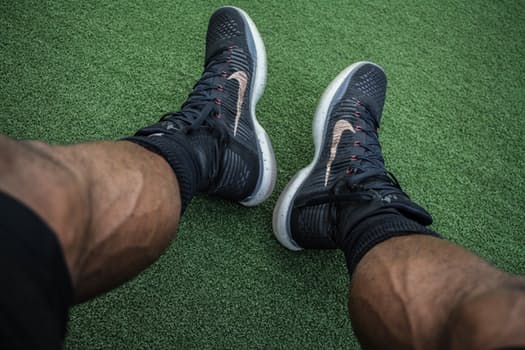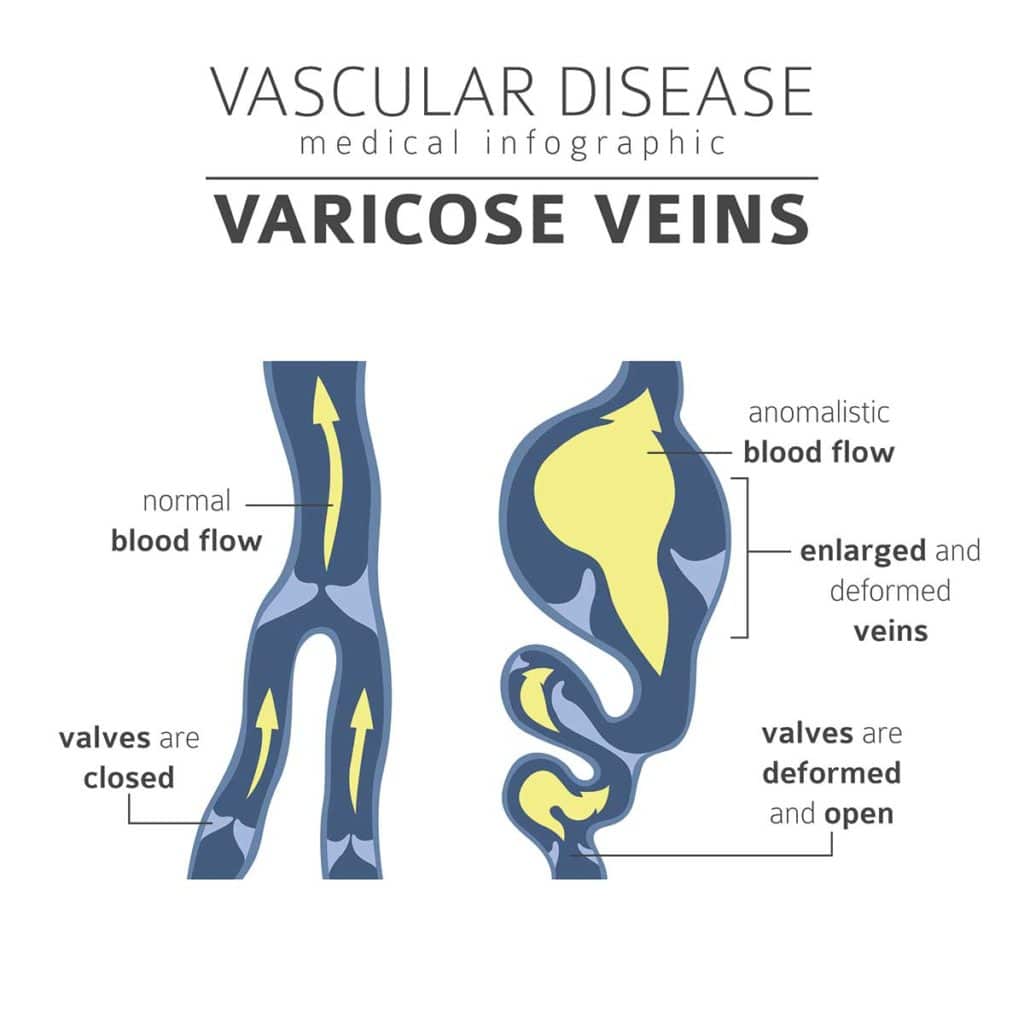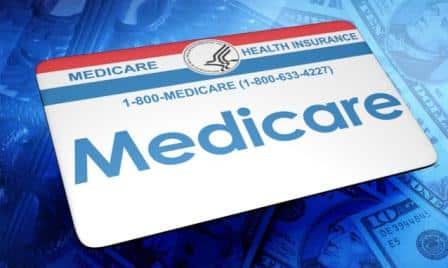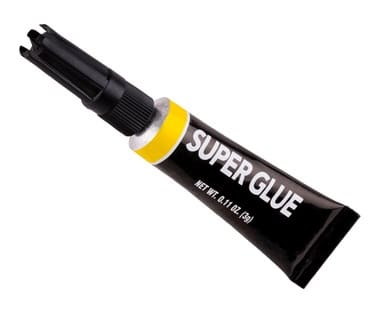Could Low Testosterone Increase the Risk of Varicose Veins in Men?

It’s a common misconception only women suffer from varicose veins, however, it is estimated that somewhere between 15% and 45% of men will develop varicose veins or venous insufficiency at some point in their lives. The exact number is unknown, primarily because a significant number of men do not seek treatment for vein disorders.
There are several factors that contribute to varicose vein formation; genetics, age, diet, exercise, stress, and weight are all important to vein health. But gender is also considered a risk factor and there are some indications that our “sex hormones” may be the culprit - particularly estrogen.
Estrogen in Men? Definitely!
While women synthesize most of their estrogen in their ovaries and other reproductive tissues, men produce estrogen through a process involving an enzyme called aromatase. Aromatase is found in many tissues including gonads, brain, adipose tissue, blood vessels, skin, and bone. Aging men sometimes have too much aromatase activity, which causes their testosterone to convert to excess estradiol, the predominant form of estrogen.
Estradiol is a known contributor to varicose vein development in pregnant women; it shrinks and impairs the function of venous valve flaps, breaks down the integrity of venous walls, and causes blood vessels to dilate, or get wider. So what does estrogen have to do with varicose veins in men? It could be a lot!
While it is too small to be clinically significant, a study published by researchers at the Universitat Leipzig in Germany noted that all of the men in their study with varicose veins had higher levels of estradiol and lower levels of testosterone (low T) compared to the men with healthy veins. What this shows is that estradiol alone is not the culprit, rather the ratio of estradiol to testosterone appears to be the determining factor.
As men age, testosterone levels naturally decline. Where a younger man’s testosterone to estrogen levels might naturally be 50:1, an older man might experience a ratio of 8:1. What the science seems to suggest is that when the ratio of estrogen to testosterone is out of whack, men are at higher risk for developing vein disorders.
Concerned About Your Vein Health?Click Here to Download a Self Assessment |
Restoring Hormone Balance is Good for Vein Health
The hormonal system helps to govern all aspects of the bodies’ functions. Its interconnectedness is complex; its balance is somewhat delicate and can be easily thrown off track. We are bombarded by stories about potential hormone disrupters and estrogen mimickers that some fear, are messing up these complex systems. Regardless of whether this is true, there are many lifestyle choices that men can make to help maintain—or restore—hormonal balance and improve their vein health.
- Maintain a healthy weight. Obesity is a significant risk factor, both for overproduction of estrogens and for varicose vein formation. Not only do the extra pounds increase strain on the vascular system, but also fat cells are particularly rich in the enzyme aromatase. The more aromatase in the system, the more testosterone will be converted to estradiol.
- Manage your stress levels. Cortisol, the hormone associated with the “fight or flight” response, increases when stress levels are high. High cortisol levels inhibit testosterone production.
- Get good quality sleep. Most testosterone is produced when we sleep. Actually, a lot of important things happen only when we are sleeping. Plus, sleep is just awesome.
- Nourish your body. It is important to eat a wide variety of whole foods in order to get the building blocks required for good hormone production and balance.
- Exercise the right amount. Moderation in all things. Studies have found that men who exercise a LOT have lower testosterone levels than their counterparts who exercise a moderate amount.
Men who develop varicose veins should consult with a qualified vein specialist to determine whether their vascular system is compromised, and what can be done to improve venous blood flow back to the heart.
Tempe-based vein specialist, Jilanne Rose of Advanced Vein Institute of Arizona, has noticed that men tend to wait until their veins get painful—or worse—before seeking treatment. Because of this tendency, she encourages everyone to look out for the vascular health of the men—and the women—in their lives.
And these days, Jilanne adds, it is easier than ever to improve vascular health. Vein treatments are less invasive, less painful, less expensive and more successful than they have ever been. Simply make an appointment with a qualified vein specialist who can precisely determine the health of your lower extremity veins, and help you make informed decisions about what treatment (if any) is right for you.
Question & Answer 5 weeks post-EVLT, veins along my inner thigh have turned brown, and one spot is slightly red. Is this normal? Question: It’s my 1st week in Vietnam and I’m here for an additional two-and-a-half weeks. My doctor closed up a vein in my groin area 5 weeks ago. I’ve just noticed on…
Read MoreQuestion: I am 20 years old with a history of undiagnosed autoimmune disease, which is currently in an acute flare. After suffering from a case of phlebitis in greater saphenous vein of the right leg for two months, I was just recently diagnosed with venous insufficiency in both the greater and smaller saphenous veins of…
Read MoreQ & A Pregunta: ¿Qué cubre el seguro, estoy en Medicare con un suplemento. Respuesta: Medicare con un suplemento cubre las visitas a la oficina, los ultrasonidos y las intervenciones necesarias, típicamente al 100%. Por lo general, no hay un gasto de bolsillo asociado con el tratamiento en la oficina.
Read MoreQ & A Question: What do insurance cover, I am on Medicare with a supplement. Answer: Medicare with a supplement covers the office visits, necessary ultrasounds and interventions, typically at 100%. Usually there is not an out of pocket expense associated with in-office treatment.
Read MoreQ & A Pregunta: ¿Cuál es el costo promedio si tiene varices en una pierna y arañas vasculares en la otra? Respuesta: la mayoría del tratamiento de las venas varicosas, si es médicamente necesario, está cubierto por el seguro. Los costes del tratamiento de la vena de la araña varían dependiendo de la cantidad de…
Read MoreQ & A Question: What is the average cost if you have varicose veins in one leg and spider veins in the other? Answer: Most varicose vein treatment, if medically necessary, is covered by insurance. Spider vein treatment costs vary depending on the amount of veins present, if the insurance will cover them (medically necessary) and…
Read MoreVenaSeal El último tratamiento para las varices puede parecer que es directamente de una película de ciencia ficción, pero la sustancia utilizada para cerrar las venas anormales, pegamento del cianocrilato, se ha utilizado en procedimientos médicos y cirugías por décadas. ¡ Créalo o no, el pegamento del cianocrilato se ha utilizado los procedimientos desde 1949,…
Read MoreVenaSeal The latest treatment for varicose veins may seem like it is straight out of a science fiction movie, but the substance used to close off abnormal veins, cyanoacrylate adhesive, has been used in medical procedures and surgeries for decades. Believe it or not, cyanoacrylate adhesive has been used procedures since 1949, and other types…
Read MoreAlgunos buenos consejos generales fueron recientemente compartidos por el Consejo de salud de Estados Unidos sobre varices y arañas vasculares. Hay algunos puntos adicionales que deben ser considerados cuando se discute la salud venosa. Con respecto a lo que hay que recordar; es importante mantener una hidratación adecuada. Al hacerlo, se fomentará un flujo sanguíneo…
Read MoreSome good general advice was recently shared by U.S. News Health Tip regarding varicose and spider veins. There are a few additional points that should be considered when discussing venous health. Regarding do’s and don’ts to remember; it is important to maintain adequate hydration. In doing so, one will encourage healthy adequate blood flow thereby…
Read More






